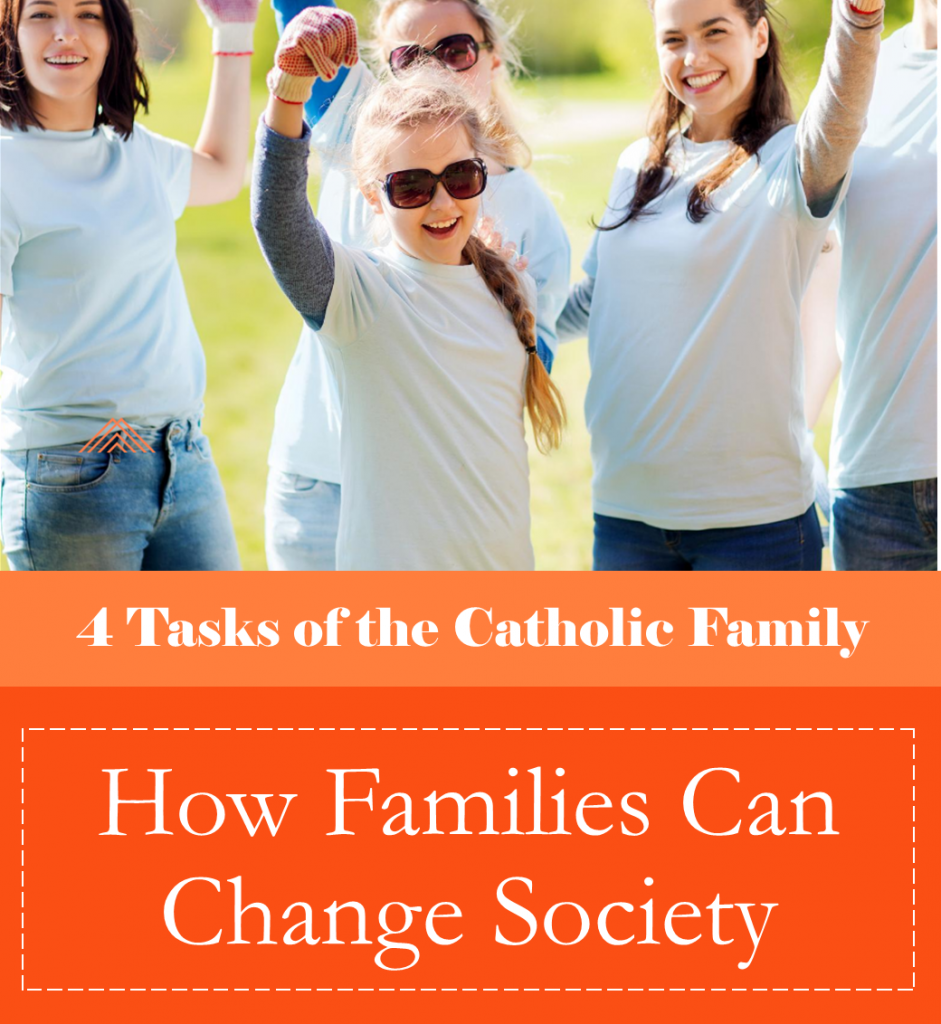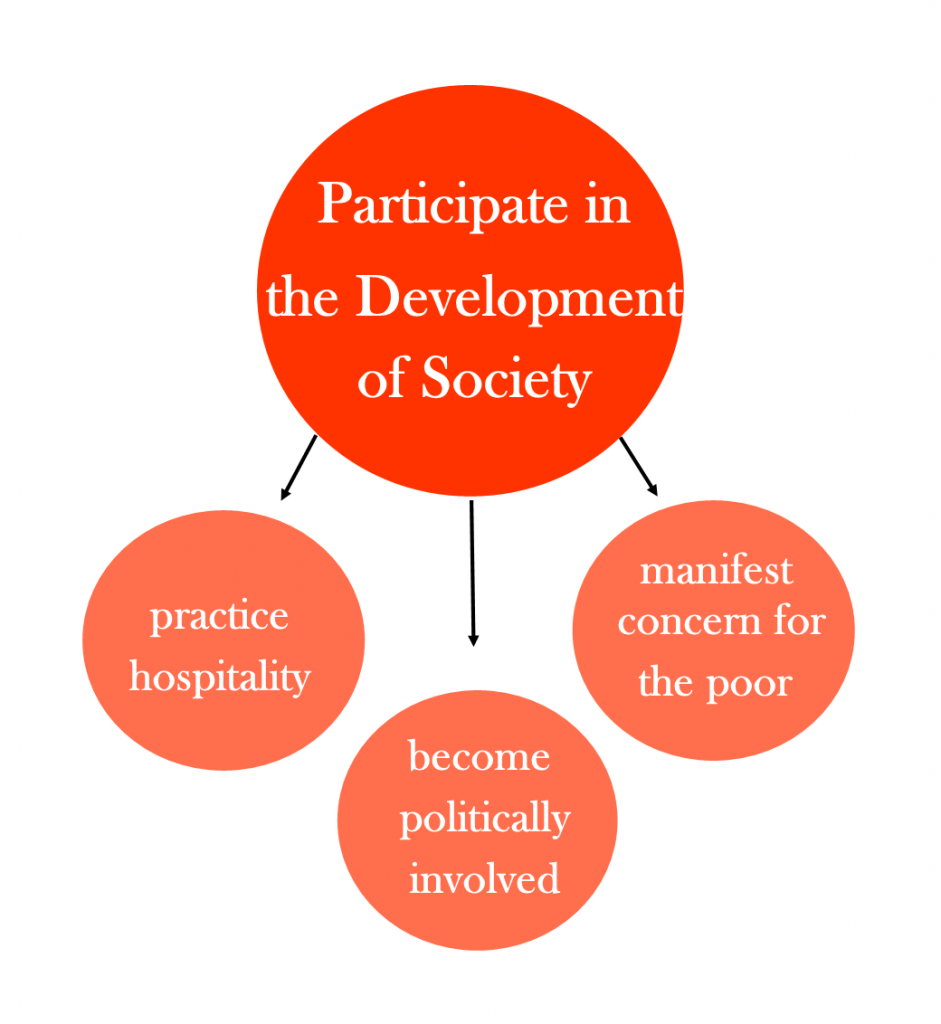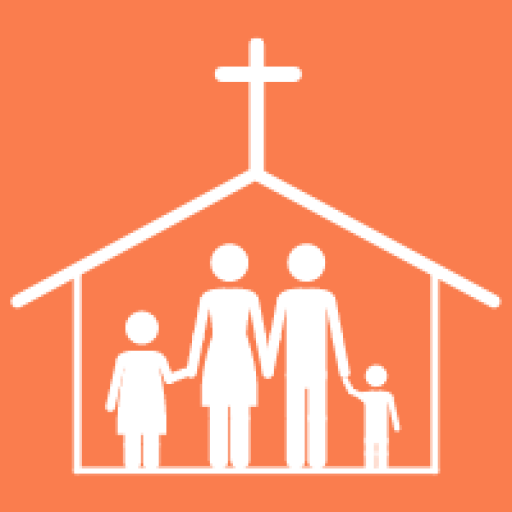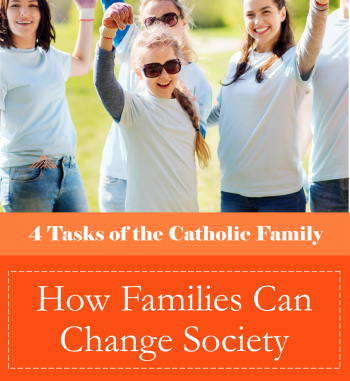
4 Tasks of the Catholic Family Series
- Build Your Community of Love
- How Families Can “Serve Life”
- How Families Can Change Society (this article)
- How Families Can Serve the Church
***
In this article series, I’m exploring the four tasks of the Catholic family as St. John Paul II outlined them in Familiaris Consortio. These four tasks clarify how we can express and live our identity and mission as Catholic families. I’ve covered the first two tasks in previous articles: our first task is to build a community of love through caring for one another and healing divisions; our second task is to serve life by welcoming, nurturing, and educating our children.
Our Third Task: Participate in the Development of Society
Today, let’s unpack our third task: participating in the development of society.
The pope cautions families not to turn in on themselves, focusing only on the needs and well-being of their own family members. When we do this, we fail to live as a domestic church, and we fail to respond to our family’s calling and mission: “[F]ar from being closed in on itself, the family is by its nature and vocation open to other families and to society and undertakes its social roles” (FC 42).
We can fulfill our social roles by focusing on three three things: practicing hospitality, becoming politically involved, and manifesting a special concern for the poor and disadvantaged.
1. Practice Hospitality
“I was a stranger and you welcomed me.” Matthew 25:35
In a society that is becoming increasingly depersonalized, standardized, and dehumanized, families have a special calling to practice the virtue of hospitality.

As Catholic Christians, we practice hospitality by welcoming our brothers and sisters into our homes, so the bonds of affection between Christians are strengthened and renewed. The early Church grew and thrived because of the hospitality of households welcoming believers to gather for Mass and fellowship. We can continue this tradition by being “that house” where other Catholic families come for connection and celebration. Many parishes right now suffer from a lack of fellowship and shared identity. New parishioners sometimes struggle to find a sense of home or belonging. Our families can become involved in the welcome ministry at our parishes, and if our parish doesn’t have one, we can start one!
A family I knew in high school had a special practice that I never forgot. Before they left for church on Sunday mornings, they set the table for Sunday dinner. They always placed an extra chair at their table with a special place setting so they could spontaneously invite somebody home for dinner every week. Some weeks they didn’t have an extra guest; some weeks they had more than one guest. But they were always ready to welcome you if you didn’t have a place to go for dinner. The family was truly Christ to many people.
2. Become Politically Aware and Involved
Here the pope encourages families to “political intervention” when laws and institutions offend the rights and duties of the family. Indeed, all such laws and institutions should support and defend the family! Section 46 of Familiaris Consortio lays out “the charter of family rights”; these are commonsense principles presented clearly.
Here are just a few of the family rights listed in the charter:
- the right of parents to bear and educate children
- the right to bring up children according to the family’s traditions and religious and cultural values
- the right to “suitable” housing for living life in a “proper” way
- the right to protect minors by adequate institutions and legislation from harmful drugs, alcoholism, pornography, etc.
As mentioned in my last article on serving life, we should also resist any corrupt or erroneous teaching in our children’s classrooms.
3. Manifest a Concern for the Poor
Finally, our families can participate in the development of society by having a special concern for “the hungry, the poor, the old, the sick, drug victims, and those who have no family” (FC 47). Practicing the works of mercy at home prepares our families to practice them beyond our front doors. When parents mentor their kids in the works of mercy as part of everyday family life, the family transitions very naturally to practicing them in their communities.
I have a ton of ideas for at-home works of mercy here, including books and games suggestions. For family community service, here are some practical ideas:
Deliver Meals: You can feed the hungry and visit the sick by delivering meals to homebound people who are sick or at home with a new baby. Here’s a Meal Train app to organize food with other families who want to help out.
Donate your talents: Whatever your family’s talents—art, music, computer programming, or storytelling—use them to bless others. You might visit those who are bedridden or in a nursing facility, create gifts for impoverished children, or donate your creative product to charity. In these ways you are comforting the sick or the sorrowful, and teaching your children that we can use all our talents to glorify God.
Create warm bundles for the homeless: Invite your kids to help you make “warm bundles” as a personal way to let a homeless person know you care. A small bundle might be a pair of mittens stuffed with snacks; a large bundle might be a blanket and a boxed dinner. If your family sews or knits, these items can be homemade. You can seek out donations for your bundles and then deliver them with your children to shelters.
Have a garage sale and donate the proceeds to a local charity: Decide ahead of time what the charity will be, then let your kids help you make signs for your charity garage sale. You may even find your neighbors want to join you. Your children will be proud to see the money they made from selling their things. If possible, take them along when you deliver the proceeds to your charity.
By serving others alongside our children, they’ll exercise their mercy muscles while being supported and mentored by us. This is less intimidating than waiting until high school when many kids are required to do a service project as a graduation requirement.
Hang On. Is He Serious?
Now, you may be wondering how you are supposed to do all this work in society when you are caring for your own children. The structure of society today leaves families isolated from extended family, which is unusual in history. Parents carry a great burden today in attending to the daily needs of their children in addition to work and housekeeping tasks, tasks that were once shared by adults in extended households.
This is a good place for a reminder that the pope is clarifying the family’s social mission, but our families don’t have only a social mission; we also have a private mission, a special fidelity to one other. Parents have a special mission in protecting and nurturing the children God has entrusted to them. Our task of “developing society” looks different when we have small kids at home.
The pope mentions that fulfilling our social mission in society becomes important “particularly as the children grow up” (FC 44). Our older children gain a sense of mission when we guide them in serving others and engaging in political struggles. When our children are small, though, we have to account for their intense need for connection and affection. We can only manage their needs by protecting the balance in our homes. If our community work creates deterioration and strain in our relationships at home, we are not building up society.
It’s okay to prioritize the needs of your children! The very communion and selfless love in our families represent our greatest contribution to society (FC 43). John Paul II reminds us repeatedly that we participate in the development of society by raising emotionally whole and spiritually vibrant children!
So, if you feel overwhelmed by the pope’s invitations, rest easy. God always gives us what we need to accomplish his will. If you have wee ones to care for, you are building up society by building them up. You may find that, as your children mature, volunteering as a family becomes a more realistic plan. I am at this stage in my mothering. I have more free time for volunteering with my kids and leading them in works of mercy at home, in our parish, and in our community. I can also alleviate the strain placed on young parents who need an extra pair of hands so they can meet their own spiritual and physical needs.
Resources
Making Room: Recovering Hospitality as a Christian Tradition by Christine Poll. A fascinating survey of the biblical and historical practices of hospitality in Christian communities.
Clear Conscience: A Catholic Guide to Voting. New from Ascension Press.
EWTN Voters Guide. Free resource.


My husband and I are loving this series! Thank you for breaking down FC and adding your ideas!! Praying for your ministry. We love everything you do!
Hello Cally,
Thank you for your comment and kind words! I’m glad you and your husband are enjoying the series. I’m enjoying writing them. God bless!